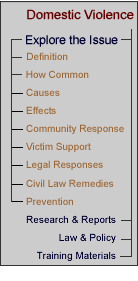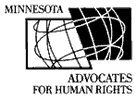|
|
|
5. Coordinating Community Responses Coordinated community response is an intervention strategy developed by the Domestic Abuse Intervention Project (DAIP) in Duluth. DAIP found that when different members of the community coordinated their efforts to protect battered women and hold batterers accountable, these efforts were more successful. Coordination helps to ensure that the system works faster and better for victims, that victims are protected and receive the services they need, and that batterers are held accountable and cease their abusive behavior. A critical first step toward coordinating responses is developing a common understanding of domestic violence. Law enforcement agencies, advocates, health care providers, child welfare agencies, local businesses, the media, employers and clergy can—and ideally should—be involved in a coordinated community response. Health care providers, in particular, can be important participants. Doctors and emergency room workers may see and treat women who do not or cannot seek other kinds of assistance. The involvement of each participant in the coordinated community response must be guided by core principles of intervention designed to protect the victim from further harm. Each actor should also build into its response opportunities to seek input from survivors of domestic violence. Such input can help ensure that the intervention is adequately responding to women’s needs and assess whether changes should be made. |
| Home | Contact | Feedback | Disclaimer |

